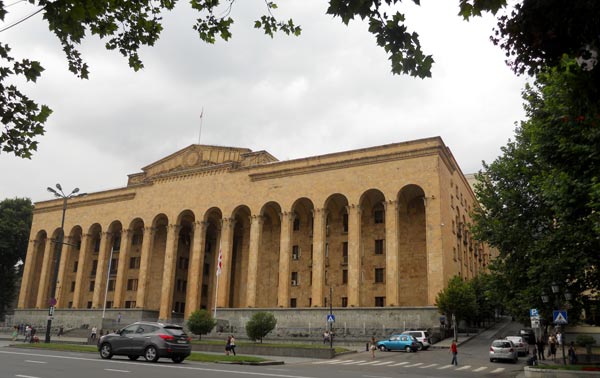Religious rage: Armenians in Georgia feel tension amid Orthodox Protests
Gohar Abrahamyan
Reporting from Tbilisi, Georgia
14.07.11
Last week’s parliamentary approval of amendments in Georgia’s Civil Code granting legal status to several religious minorities, including the Armenian Church, stirred a wave of discontent among the local Orthodox community, which only added to the numerous problems the local Armenian community has had.
Armenians in Georgia, and in particular in capital Tbilisi, lived through several tense days when the situation could even become dangerous for them as thousands of people took to the streets to protest the parliamentary resolution largely viewed as pro-Armenian.
Last week the Georgian parliament introduced amendments to the Civil Code, under which all religious organizations in Georgia were given the right to obtain legal status similar to those they enjoyed in Council of Europe member states. Among the five main beneficiaries of the amendments is also the Armenian Apostolic Church.
From the very beginning the changes have been opposed by Georgian Patriarch-Catholicos Ilia II, who urged President Mikheil Saakashvili to veto the law and to organize additional discussions.
After the statement made by the Georgian Patriarch, thousands of people in Georgia for several days on end held demonstrations of protest in front of the parliament building with calls against “anti-Orthodox forces”. Protests were halted only on Tuesday after a strict order came from the mayor of Tbilisi and, most importantly, certain revisions had been made by Georgian lawmakers in the Civil Code that essentially reduced the former broad powers granted to religious organizations.
Servants and the priest of the Georgian St. George Church situated near the Georgian parliament building would not speak to a group of visiting Armenian reporters (in Tbilisi these days as part of an IWPR program). They only said they were against the bill and that the legislative body had no right to ignore their views.
People in the street were more willing to talk, though.
Tengis Tapatadze, one of those who actively participated in the protests, said he was for the country’s principal religion to be put first.
“Maybe I am wrong, but this is a very delicate matter, these changes were not appropriate or timely,” said Tapatadze.
The number of Armenians in Georgia is around 300,000, making it the second largest ethnic minority in the country. Also, more than 300 Armenian churches are situated in the territory of Georgia. Only 40 of them are functioning churches. In capital Tbilisi only two of six Armenian churches do function, while two are in ruins and the other two belong to the Georgians. The Armenian side, however, demands that they be returned.
According to the locals, this is exactly the reason why the attitude towards the Armenian community drastically changed after the adoption of the legislative change, since by having the status of a legal entity of public law the Armenian side gets greater opportunities for setting demands.
“Georgians are most of all against Armenian churches, because they know that historically Armenians here had great estates, and they are concerned that if we become a legal person, as successors we will be able to claim our ancestral property,” Samvel Hakobyan, a local Armenian, told ArmeniaNow.
It was also in the media that protests in Georgia were followed by disturbances in which a group of Georgian Armenians suffered only because they were Armenians and had religious affiliation to the Armenian Apostolic Church. However, Mari Mikoyan, a spokesperson for the Armenian community of Georgia, told ArmeniaNow that the information was false.
“Of course, there has always been Armenophobia in Georgia, but there have not been cases of violence, although the situation in the city was tense and could explode any minute,” said Mikoyan, adding that while the Georgians were protesting, many of them do not have a clear idea against what they were protesting.
“The Georgian people have little fault in it. This is what was organized by the Georgian Orthodox Church clergy. The only person in Georgia that enjoys universal respect is the patriarch. If the patriarch says something, it is like God saying something. And it doesn’t matter what law was passed, how much this law is adequate, if the patriarch said that protesting is required, that’s it.”
Bishop Vazgen Mirzakhanyan, the primate of the Armenian Apostolic Church’s diocese in Georgia, said in an interview with ArmeniaNow that they were asked not to give explanations or say nothing on the subject until the situation calmed down. He only added that the latest events made Armenians sober up even more.
“Last Sunday more people than before went to church, which means they had come to show that we were here to support the Armenian Church. I think that this way Armenian roots should grow stronger,” said the bishop.


334044 593013Aw, it was a extremely great post. In thought I would like to devote writing such as this furthermore,?C spending time and specific function to produce a fantastic post?- nonetheless so what can I say?- I waste time alot and never at all seem to obtain 1 thing completed. 603501